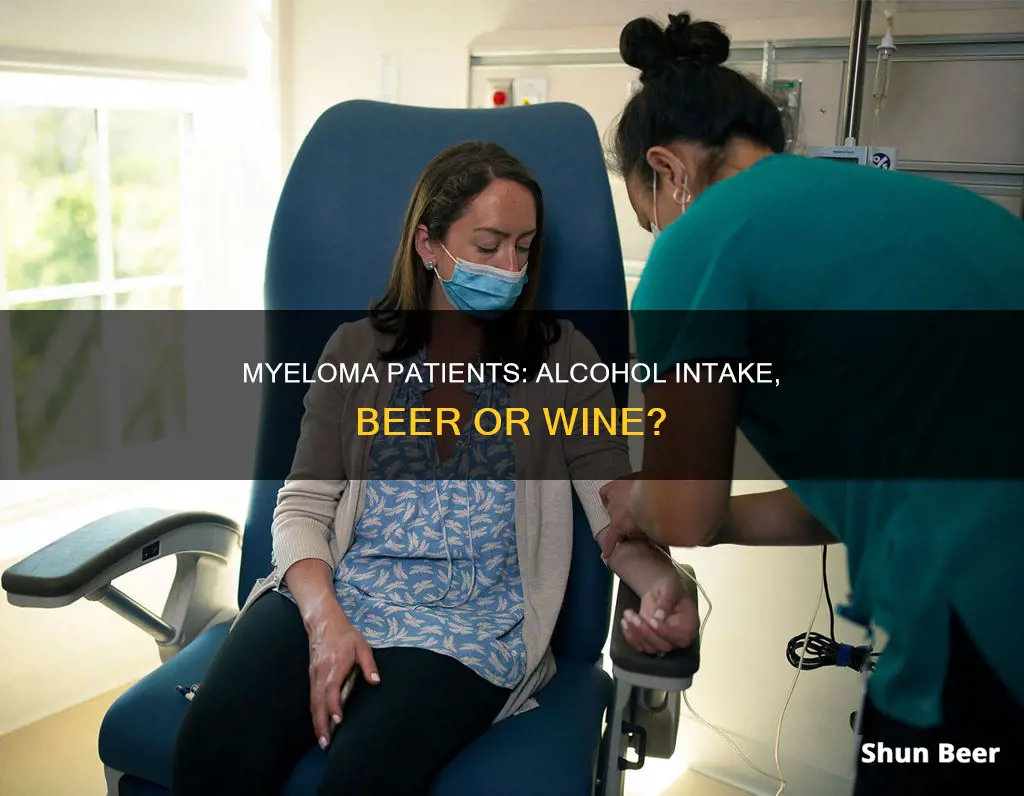
Alcohol consumption is a contentious topic for multiple myeloma patients. While some sources suggest that drinking alcohol may reduce the risk of developing multiple myeloma, others emphasise the adverse effects of alcohol on cancer treatment.
Recent studies indicate that consuming alcohol may lower the risk of multiple myeloma. A 2013 analysis of 1,567 myeloma patients and 7,296 controls found that those who drank alcohol had a lower risk of developing the disease compared to non-drinkers. Similarly, a 2018 study of 499,292 participants in the NIH-AARP Diet and Health Study found that moderate alcohol consumption was associated with a reduced risk of developing multiple myeloma.
However, alcohol can negatively impact cancer treatment in several ways. It can interfere with bone marrow function, exacerbating issues for patients with blood and marrow cancers like multiple myeloma. Alcohol also acts as a sedative and can worsen fatigue, a common symptom of multiple myeloma. Additionally, alcohol can irritate the stomach lining, causing nausea, and can increase the risk of infections by impairing immune function.
Given these mixed findings, multiple myeloma patients should consult their oncologist or healthcare provider for personalised advice regarding alcohol consumption.
| Characteristics | Values |
|---|---|
| Alcohol consumption | May reduce the risk of myeloma |
| Alcohol type | Beer, wine, liquor |
| Amount | No relationship to the amount or the number of years of drinking |
| Occasion | Occasional drinking may be approved by a specialist |
| Health | Heavy alcohol drinking is linked to impaired immune function and increased susceptibility to infection |
What You'll Learn

Alcohol may reduce the risk of multiple myeloma
Alcohol consumption may be associated with a reduced risk of multiple myeloma (MM). A pooled analysis of six case-control studies found that participants who drank alcohol had a lower risk of MM compared to those who never drank. The analysis included 1,567 cases and 7,296 controls and adjusted for age, race, and study centre. The inverse association was stronger for current drinkers compared to never drinkers (men: OR=0.57, 95% CI 0.45-0.72, women: OR=0.55, 95% CI 0.45-0.68). However, no dose-response relationship was observed with alcohol frequency, duration, or cumulative intake.
The protective effect of alcohol on MM risk is not well understood. Some studies have suggested an inverse relationship between alcohol consumption and MM risk, while others have found no association. The biological mechanisms underlying this potential association are not clear and require further investigation. It is important to note that heavy alcohol consumption is linked to an increased risk of adverse health outcomes.
In conclusion, while alcohol consumption may be associated with a reduced risk of MM, it is important for patients to consult their healthcare provider for personalised advice regarding alcohol consumption, as it can affect treatment and symptoms.
Drinking Beer on Virginia Beach: What's the Deal?
You may want to see also

Alcohol can worsen multiple myeloma symptoms
While some studies suggest that consuming alcohol may reduce the risk of multiple myeloma, there is no clear evidence of a causal relationship between the two. However, alcohol consumption can still negatively impact patients with multiple myeloma in several ways and worsen their symptoms.
Firstly, alcohol is a sedative and can induce fatigue. Given that people with multiple myeloma often experience fatigue, consuming alcohol may worsen this symptom. Alcohol consumption can also lead to dehydration, nausea, vomiting, and stomach pain, which are also common gastrointestinal issues faced by multiple myeloma patients. Therefore, drinking alcohol can further exacerbate these issues and negatively impact the patient's overall well-being.
Secondly, multiple myeloma and its treatments can affect the immune system, making patients more susceptible to infections. Research has linked heavy alcohol use to impaired immune function, increasing the risk of infections, especially bacterial pneumonia. Thus, alcohol consumption can further compromise the immune system of multiple myeloma patients, making them more vulnerable to infections.
Additionally, alcohol can interfere with the healthy production of white blood cells, red blood cells, and platelets in the bone marrow. For patients with multiple myeloma, bone marrow function may already be compromised due to the disease itself and the side effects of treatments such as chemotherapy and radiation therapy. Alcohol consumption can further strain bone marrow function and exacerbate the condition.
Furthermore, alcohol can interact with medications taken to control pain or nausea in multiple myeloma patients, enhancing their sedative effects. This can further contribute to fatigue and impact the patient's quality of life.
While the decision to consume alcohol during cancer treatment is a personal one, it is crucial to be aware of the potential risks and side effects. Consulting with a healthcare professional is essential to make an informed decision regarding alcohol consumption during multiple myeloma treatment. They can provide personalized advice based on the patient's medical history, risk factors, and treatment regimen.
Beer Drinking: Time to Stop or Slow Down?
You may want to see also

Alcohol can affect blood cells and bone marrow
Alcohol can have a detrimental impact on bone marrow and blood cells, which is especially significant for patients with multiple myeloma, a type of blood cancer.
Firstly, alcohol interferes with the healthy production of white blood cells, red blood cells, and platelets in the bone marrow. This is concerning as multiple myeloma patients already have a higher risk of low healthy blood cell counts due to an overgrowth of myeloma cells. White blood cells are essential for fighting infections, red blood cells are vital for energy and oxygen transport, and platelets are responsible for blood clotting. Therefore, alcohol can leave individuals more susceptible to infections, tired, weak, and at risk of excessive bleeding and strokes.
Secondly, alcohol can cause direct damage to bone marrow and blood cells. Research has shown that alcohol intake can have toxic effects on bone marrow, reducing the production of red and white blood cells, as well as platelets. This damage is reversible, and normal bone marrow cell cultures may be a typical feature of alcohol-induced bone marrow damage.
Additionally, alcohol can worsen the symptoms and side effects of multiple myeloma and its treatments. For example, alcohol can increase fatigue, irritate the stomach and gastrointestinal tract, and negatively interact with certain medications.
While some studies suggest that light to moderate alcohol intake may have potential health benefits, the negative impacts of alcohol on bone marrow and blood cells are significant, especially for those with multiple myeloma. Therefore, limiting or eliminating alcohol is generally recommended for patients undergoing cancer treatment, and patients should consult their healthcare provider for advice regarding alcohol consumption.
Non-Alcoholic Beer: Healthy Alternative or Just a Gimmick?
You may want to see also

Alcohol may interact with multiple myeloma treatment
Alcohol may affect how well your multiple myeloma treatment works. It can also worsen side effects and increase the risk of other chronic conditions and cancers.
Bone Marrow Function
Alcohol can interfere with the healthy production of white blood cells, red blood cells, and platelets in your bone marrow. For patients with blood and marrow cancers, bone marrow function may already be strained due to the disease and its treatment. The impact of alcohol on bone marrow function could, therefore, be more dramatic and serious.
Fatigue
Alcohol is a sedative that can worsen fatigue, a common symptom of multiple myeloma. It can also add to the sedative effects of medications taken to control pain or nausea.
Irritation to Your Stomach
Alcohol can irritate the lining of your stomach and gastrointestinal tract, similar to radiation therapy or chemotherapy. This is especially true for those experiencing oral mucositis or mouth sores.
Liver Function
Many chemotherapy drugs are broken down by the liver, which can cause stress and damage to this organ. Alcohol is also metabolized by the liver, and drinking it will cause additional stress and possible permanent damage.
Immune System
Heavy alcohol use has been linked to impaired immune function and increased susceptibility to infections, particularly bacterial pneumonia. People with multiple myeloma may also have frequent infections due to the disease and its treatment affecting the immune system.
Beer Drinking and Avoiding the Gut
You may want to see also

Heavy alcohol consumption is linked to impaired immune function
Multiple myeloma patients already have a weakened immune system due to the disease and its treatments. Alcohol consumption can further impair their immune function, increasing their susceptibility to infections. Alcohol has been linked to reduced function of the immune system, with research linking heavy alcohol use to impaired immune function and increased susceptibility to infections, particularly bacterial pneumonia. This is of particular concern for multiple myeloma patients, who are already at an increased risk of infections due to the disease and its treatments.
Heavy alcohol consumption can also affect the gastrointestinal (GI) tract, damaging epithelial cells, T cells, and neutrophils in the GI system, and disrupting gut barrier function. This can facilitate the leakage of microbes into the circulation, which can have systemic effects, including triggering inflammation in the liver, which can lead to alcoholic liver disease (ALD).
In addition, alcohol can impact the cells within the airways, reducing their ability to remove mucus from the lungs and damaging lung tissue. This can lead to a weakening of lung function over time, making multiple myeloma patients more susceptible to respiratory infections and increasing their risk of developing serious conditions such as pneumonia.
Overall, heavy alcohol consumption can have detrimental effects on the immune system, increasing the risk of infections and diseases. For multiple myeloma patients, who already have a weakened immune system, alcohol consumption can further impair their immune function and increase their susceptibility to infections and other health problems. Therefore, it is generally recommended that multiple myeloma patients avoid alcohol consumption or drink in moderation, after consulting with their healthcare provider.
Kayaking and Beer: A Fun, Safe Lake Erie Adventure
You may want to see also
Frequently asked questions
It depends on various factors and the patient's doctor is the best source of advice on drinking alcohol with their condition. Generally, it is recommended that patients avoid drinking while undergoing cancer treatment.
Yes, alcohol can worsen multiple myeloma symptoms such as fatigue, gastrointestinal issues, and impaired kidney function.
There is some evidence that specific beverages like red wine and beer may have benefits due to the presence of polyphenols and prenylflavonoids, respectively. However, heavy alcohol drinking is linked to impaired immune function and increased susceptibility to infections.
It is generally not advised to drink alcohol while undergoing cancer treatment, especially with certain chemotherapy drugs. Alcohol can worsen the side effects of cancer treatments and interfere with their effectiveness.
Yes, patients can consider mocktails, which are non-alcoholic drinks that can be made with fruit juices and other ingredients.







